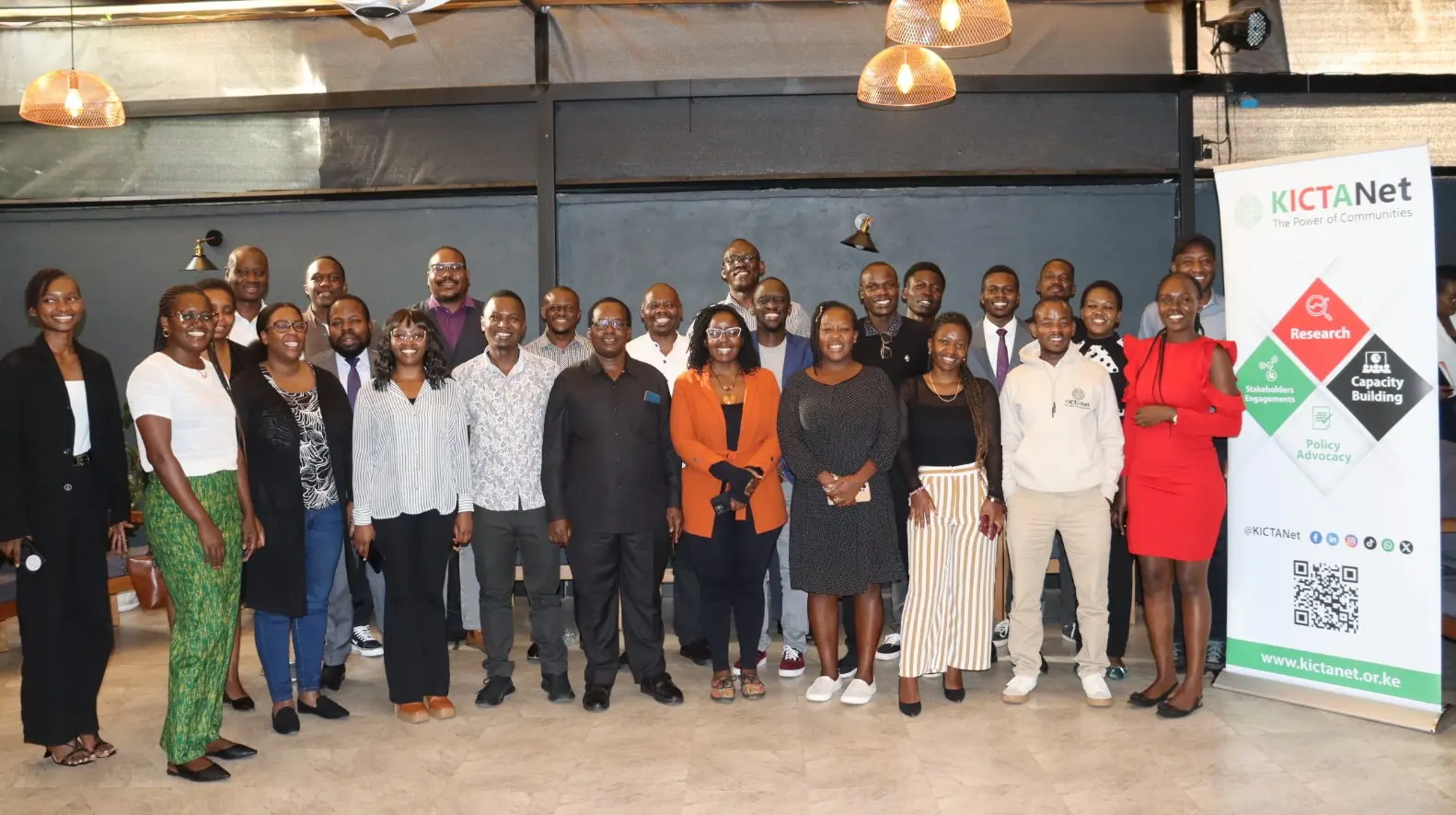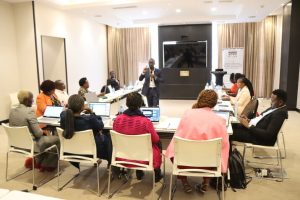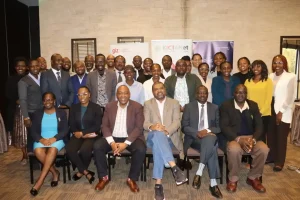The Bloggers Association of Kenya (BAKE) and KICTANet convened a forum in Nairobi focused on “Building Coalitions for Digital Rights in Kenya,” addressing the need for a united and strategic approach to safeguarding online freedoms amid increasing digital space challenges.
The forum brought together civil society leaders, media representatives, legal experts, and policymakers to forge a stronger front against growing restrictions.
Kennedy Kachwanya, Chair of BAKE, opened the forum by highlighting the rapid expansion of Kenya’s digital landscape, evidenced by current data from the Communications Authority (CA) showing a 3.2% increase in mobile data subscriptions to 56.1 million in Q2 2024-2025, with a significant 78.4% being mobile broadband.
Mobile phone device connections reached 72 million, a penetration rate of 139.8%, and smartphone penetration stood at 80.5%, supported by 97% mobile broadband network coverage.
Despite this growth, Kachwanya noted the increasingly restrictive policies such as internet shutdowns and censorship, emphasising the necessity of inclusive advocacy.
Kachwanya stated, “We need to map the stakeholders involved in digital rights initiatives. You cannot build a solution without knowing who is doing what.”
Key focus areas include legal advocacy, strategic engagement, and training the judiciary on digital rights. He also called for alternative dispute resolution mechanisms and stressed the need for public engagement, asking, “How do we ensure that whatever we discuss here doesn’t remain within this place? We must reach all Kenyans, wherever they are.”
Further advocating for digital security training, bridging the digital divide, and strengthening local and international collaborations, Kachwanya noted, “We are not starting from a blank space,” highlighting existing partnerships and the need to unify them under a broader umbrella for digital rights advocacy.
Experts Warn of Government Overreach, Push for Digital Rights Law
Victor Kapiyo, Board Trustee at KICTANet, provided a policy perspective, describing the organisation’s role in supporting an open, inclusive, secure, and rights-based digital ecosystem.
He explained, “We conduct digital security awareness programs because when digital rights come under threat, civil society organizations are often the first targets.”
Kapiyo pointed to recent government actions like internet shutdowns and restrictive legislation such as the Computer Misuse Act amendments, questioning their legal basis and urging collective pushback.
He warned against the normalisation of social media clampdowns, noting, “We are seeing increasing warnings from government officials that social media is bad and needs to be controlled. But, we are not pushing back against that messaging, and that’s how the space becomes constricted.”
Kapiyo also highlighted upcoming regulatory changes by the Communications Authority and the need to scrutinise their impact on digital freedoms. He called for a unified stance on digital rights issues, asking, “Do we even have a common position? Or are we saying it is okay when media and social media are restricted?”
Demas Kiprono, Deputy Executive Director at ICJ Kenya, echoed these concerns, stating, “From civil society, the report correctly diagnoses that, yes, we have increased digitisation… this means that our field of expression, our access to information, our association, our privacy, our economic prospects, are dictated in the digital sphere, and we have seen that the government is looking at the digital space, first of all, as a threat… And the talk about regulation is a real threat to civic space.”
Demas emphasised the need for capacity building for policymakers and the judiciary on digital rights.
Miriam Beatrice Wanjiru, Programs Officer for East Africa at Paradigm Initiative, stressed the urgency of building strong coalitions and empowering marginalised voices. “What we should, in fact, do is empower them to speak in their own voices and their own language, and tell the, you know, issues that touch their day to day.”
She also highlighted the importance of inclusive stakeholder mapping and learning from digital rights advocacy efforts across Africa.
Abraham Mariita, Project Director at Internews, detailed the “Kenya Safe and Inclusive Digital Space (KensafeSpace) project” aimed at strengthening human rights organisations’ capacity in digital safety and rights.
He emphasised the power of collaboration and the need to bring together diverse voices in the digital rights discourse.
Legal Strategies and Public Engagement Key to Coalition’s Success
Winfred Gakii, Legal Projects Manager for Africa at the Thomson Reuters Foundation, highlighted the legal threats faced by journalists and the crucial role of legal support and training in safeguarding media freedom, which is intrinsically linked to digital rights.
She introduced the trust law service as a valuable resource for pro bono legal support for CSOs and media.
Eric Oduor, Secretary General of the Kenya Union of Journalists (KUJ), delivered a powerful message about the dangerous territory concerning digital rights, urging the immediate development of a specific law to protect these freedoms from government overreach.
“Let us think of a law to regulate this sector and a law that will protect these rights… Let us steal the thunder from them and propose.”
He called for proactive engagement with Parliament and learning from international best practices.
Lawyer Ochiel Dudley offered a legal perspective, highlighting the availability of pro bono legal support but expressing caution about presenting a bill to the current Parliament.
Oloo Janak from the Correspondents Association of Kenya stressed the digital divide and the need to mobilise citizens nationwide in the fight for digital rights, emphasising digital hygiene and collaboration.
The forum underscored a growing consensus among Kenyan stakeholders on the urgent need for a unified, inclusive, and strategic approach to protect digital rights, counter restrictive government actions, and ensure a free and open digital space for all citizens.
![]()





How can I get more information about this program?